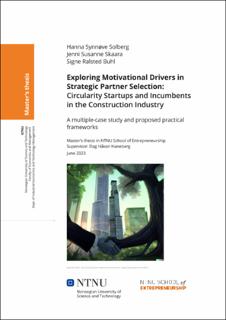| dc.contributor.advisor | Haneberg, Dag Håkon | |
| dc.contributor.author | Buhl, Signe Ralsted | |
| dc.contributor.author | Skaara, Jenni Susanne | |
| dc.contributor.author | Solberg, Hanna Synnøve | |
| dc.date.accessioned | 2023-10-25T17:19:51Z | |
| dc.date.available | 2023-10-25T17:19:51Z | |
| dc.date.issued | 2023 | |
| dc.identifier | no.ntnu:inspera:152978446:152981933 | |
| dc.identifier.uri | https://hdl.handle.net/11250/3098775 | |
| dc.description.abstract | Formålet med denne forskningsrapporten er å få innsikt i motivasjonsdrivere som opptrer i partnerutvelgelsesprosessen i strategiske partnerskap mellom oppstartsbedrifter og etablerte aktører, med fokus på byggebransjens overgang til sirkulær økonomi. Studien formulerer tre forskningsspørsmål [FS) for å adressere mangler i eksisterende litteratur; (FS1) Hva er motivasjonsdriverne i oppstartsbedrifter og etablerte selskaper i en strategisk partnerutvelgelsesprosess? (FS2) Hvordan identifiserer oppstartsbedrifter og etablerte selskaper hverandres motivasjonsdrivere i partnerutvelgelsesprosessen, og i hvilken grad forstår de hverandres motivasjonsdrivere? og (FS3) Hvorfor er det viktig å forstå motivasjonsdriverne til potensielle partnere i partnerutvelgelsesprosessen for strategiske partnerskap mellom oppstartsbedrifter og etablerte selskaper? For å svare på disse spørsmålene har vi gjennomført en omfattende forskningsstudie på strategiske partnerskap mellom oppstartsbedrifter og etablerte aktører i den norske byggebransjen. Dette innebærte et litteratursøk, utvikling av et teoribasert konseptuelt rammeverk for å identifisere motivasjonsdrivere i en partnerskapsutvelgelsesprosess mellom to bedrifter, utvikling av to preskriptive rammeverk for motivasjonsdrivere i henholdsvis oppstartsbedrifter og etablerte bedrifter, gjennomføring av intervjuer med fire partnerskap, og en abduktiv multippel casestudie.
Studien viser at oppstartsbedrifter har en god forståelse av de etablerte bedriftenes motivasjonsdrivere på grunn av deres behov for ressurser, deres tendens til å vektlegge relasjonelle aspekter i et forretningsforhold, og deres fokus på utvikling av produkter og tjenester. Oppstartsbedriftenes evne til å identifisere de etablerte aktørenes drivkrefter kan redusere eksisterende barrierer og dermed gjøre det lettere å integrere bærekraftige innovasjoner i byggebransjen. På den annen side har de etablerte aktørene begrenset forståelse for oppstartsbedriftenes motivasjonsdrivere på grunn av deres vektlegging av kost-nytte-analyser, avhengighet av eksterne aktører for strategisk problemløsning, samt på grunn av asymmetrisk maktdynamikk mellom oppstartsbedrifter og etablerte aktører. For å fremme sirkulær innovasjon gjennom partnerskap mellom oppstartsbedrifter og etablerte selskaper bør de etablerte selskapene arbeide for å bedre forstå oppstartsbedriftenes motivasjonsfaktorer, og dermed forbedre partnerutvelgelsesprosessen. Videre gir studien praktiserende forskere to preskriptive rammeverk for motivasjonsdrivere i oppstartsbedrifter og etablerte selskaper under en partnerutvelgelsesprosess, som gir verdifull innsikt i hvordan man kan evaluere potensielle strategiske partnerskap mellom oppstartsbedrifter og etablerte selskaper, og som kan støtte beslutningsprosesser i slike partnerskap.
Denne forskningen bidrar til å fylle hull i litteraturen om valg av strategiske partnerskap og samarbeid mellom oppstartsbedrifter og etablerte selskaper. Studien gir et helhetlig bilde av partnerutvelgelsesprosessen og identifiserer motivasjonsfaktorer hos både oppstartsbedrifter og etablerte selskaper. I tillegg bidrar studien til forståelsen av strategiske partnerskap mellom oppstartsbedrifter og etablerte aktører i byggebransjen, og innvirkningen slike partnerskap har på implementeringen av sirkulær økonomi.
Nøkkelord: Strategiske partnerskap, oppstartsbedrifter, etablerte selskaper, partnervalg, sirkulæritet, byggebransjen, motivasjonsdrivere, bærekraftig omstilling, samarbeid, innovasjon. | |
| dc.description.abstract | The purpose of this research paper is to gain insight on the motivational drivers in the partner selection process of strategic partnerships between startups and incumbents, with a specific focus on the construction industry's transition towards circularity. The study formulates three research questions to address the gaps in the existing literature; (RQ1) What are the motivational drivers in startups and incumbents in a strategic partner selection process?; (RQ2) How do startups and incumbents identify each other’s motivational drivers in the partner selection process, and to which degree do they understand each other's drivers?; and (RQ3) Why is it important to understand motivational drivers of potential partners in the partner selection process of strategic partnerships between startups and incumbents? In order to answer these research questions, an extensive research study on strategic partnerships between startups and incumbents in the Norwegian construction industry was conducted. The research included conducting a literature review, developing one conceptual framework for identifying motivational drivers in a partner selection process between two firms, developing two prescriptive frameworks for motivational drivers in startups and incumbents, respectively, conducting interviews with four partnerships, and conducting an abductive multiple case study.
The study reveals that startups have a good understanding of incumbents' motivational drivers due to their need for resources, their relational nature, and their focus on product or service development. Startups' ability to identify incumbents' drivers can lower barriers and facilitate the integration of sustainable innovations into the construction industry. On the other hand, incumbents’ understanding of startups' motivational drivers is limited due to their emphasis on cost-benefit analysis, reliance on external entities for strategic problem-solving, and asymmetric power dynamics. To foster circular innovation in startup-incumbent partnerships, incumbents should make efforts to understand startups' motivational drivers and thus improve the partner selection process. Furthermore, the study provides practitioners with two prescriptive frameworks of motivational drivers in circularity startups and incumbents during a partner selection process, which provide valuable insights to evaluate potential circularity startup-incumbent partnerships and can support decision-making in such partnerships.
The contributions of this research lie in filling the gaps in the literature on partner selection and collaboration between startups and incumbents. It provides a comprehensive view of the partner selection process and identifies motivational drivers in both startups and incumbents. Moreover, the study contributes to the understanding of strategic partnerships in circularity startups and incumbents in the construction industry and their impact on implementing circular economy practices.
Keywords: Strategic partnerships, startups, incumbents, partner selection, circularity, construction industry, motivational drivers, sustainability transitions, collaboration, innovation. | |
| dc.language | eng | |
| dc.publisher | NTNU | |
| dc.title | Exploring Motivational Drivers in Strategic Partner Selection: Circularity Startups and Incumbents in the Construction Industry | |
| dc.type | Master thesis | |
